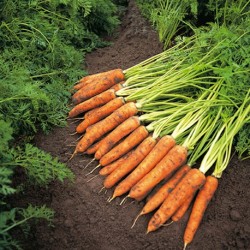- -10%



Amsterdam is an early carrot variety. Ideal for sowing the seeds under protection from as early as February. The relatively short roots makes this carrot a must have in shallow soils; and also ideal for baby carrot production. The cylindrical roots are deep orange in colour and have almost no core. Carrots are rich in antioxidants and vitamin A. Roots are delicious raw when they are young and great for cooking too. Approximately 100 days from sowing to full maturity.
Carrots are a popular crop for farmers and homeowners alike. They are a relatively easy vegetable to grow and give an excellent yield that can be staggered over the harvest season lasting through the winter months. In addition, carrots are an excellent crop to grow in a variety of spaces, but are especially well suited for growing in small spaces. as they can be planted quite densely making them a great choice for those with small gardens or even balcony gardens.
Planting
You can begin sowing your carrot seeds directly into your garden bed beginning in early spring (April and then continue planting carrot seeds every three weeks until the end of July. By doing so you will help to ensure you have a steady supply of carrots right through the winter months.
Prior to planting carrots ensure that your soil is free of any stones or any compacted chunks of soil. By doing soil you will help ensure that your carrots grow nice and long and don’t split in two and grow in “funky shapes”.
Soil for your carrots should be fertile and light in nature. Using an organic fertilizer to refresh your soil will help to increase your yields and produce better carrots. Your garden should be in full sun.
Carrot seeds are very small and therefore should be sown shallowly in the soil. Seeds should be planted just ¼” deep into the soil and be careful to gently mist the soil after planting to water as to ensure that the carrot seeds to not wash away. The newly planted carrot seeds will also need to be kept moist until the seeds begin to germinate. To help with the germination process you may wish to use a row cover.
Thinning carrots, removing smaller and carrots that are growing too close to one another, allows your carrot patch to grow and allows the carrots you choose to remain to receive adequate water, light and nutrients. This important task can be performed as soon as your carrots begin to grow and should continue to be done as they mature. A good rule of thumb is to leave one carrot for every 3cm.
Once your carrots have emerged you want to continue watering whenever the soil dries. Keep your garden weed free so that your crops have less competition for nutrients and water.
Companion Planting and Crop Rotation
Vegetables often perform better when they are planted with a “companion plant”. A companion plant helps to fend off harmful insects, help with fixing nutrients in the soil and overall help with the overall performance of the plant. Carrots perform best when planted with: beans, chives, lettuce, onions, peas, radishes, rosemary, sage and tomatoes. Avoid planting carrots with dill, celery, potatoes and parsnips.
You should also take note not to plant carrots in the same location that you had previous planted a root vegetable the year before such as potatoes. Doing so can encourage damage done by insects such as grubs. Carrots and other root vegetables should follow a crop such as beans or peas.